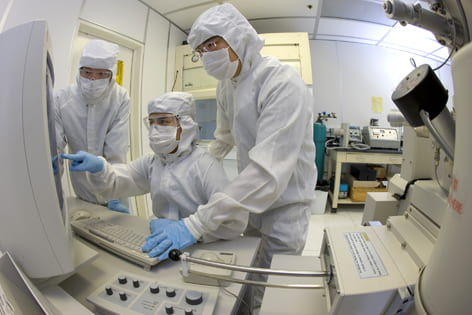Small-scale lab yields large possibilities
UC Irvine opens its second clean room suitable for producing microdevices with organic material.

The next generation of miniature devices designed to improve the lives of people around the world may be coming from a clean room facility at UC Irvine.
The 4,000-square-foot, Bio-Organic Nanofabrication facility in the California Institute for Telecommunications & Information Technology building was created for scientists wishing to build microdevices with organic materials such as living tissue, proteins and collagens.
“It’s a new concept,” says Mark Bachman, co-founder and associate director of UCI’s Integrated Nanosystems Research Facility. “I don’t know of any other multiuser facility dedicated to this type of manufacturing.”
The clean room will allow researchers to develop advanced healthcare technologies such as biodegradable implants designed to deliver medication. Miniaturized devices for use in engineering, the life sciences and medicine also will be built. BiON’s “class 1,000” designation means researchers can work at a scale that is 1/1,000 of a millimeter – or 1/100 the diameter of a human hair.
Just as many electronics manufacturers turned to miniaturization a few decades ago to reap benefits such as increased portability and lower cost, biomedical and biotechnology researchers are attracted to smaller medical devices and implants that are more efficient and less invasive. The idea to build a second micro- and nanoscale manufacturing facility at UCI dedicated to organic materials arose when Bachman noticed life sciences researchers trying to work in clean rooms where dry, high-temperature processes used to build electronic devices from inorganic substances could harm or destroy natural materials.
“In our quest to support the life sciences, we found a lot of things that needed to be changed in the manufacturing process. For example, an antenna is built differently than an implantable microelectrode,” Bachman says. “Until BiON, it was difficult to find places to manufacture and prototype products that use natural materials.”
BiON features tools designed for use with sensitive organic materials, including machines that can operate under constantly wet conditions, special incubators for growing cells, high-precision laser etching and specified areas for low-temperature processing.
“BiON is a great resource for our academic research, for industry and for education,” Bachman says. “Now, our students have access to a place where they can look at cutting-edge ways of manufacturing.”